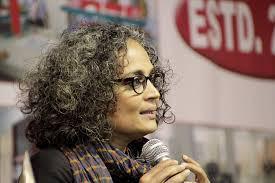This blog post is almost two years old but somehow never made it online. The topic, however, of how male journalists talk to/write about women they interview is still a problem that needs to be addressed.

I feel a twinge at seeing Stephen Moss’s by-line on the Guardian interview with Arundhati Roy. He is a middle-aged white man with an improbably thick neck who describes himself as a “keen but useless chess player” and is the editor of The Wisden Anthology 1978-2006: Cricket’s Age of Revolution. I wonder what qualifies him to interview a feminist, social-activist Indian writer whose book, Broken Republic, is comprised of three essays about indigenous resistance movements in India. Did they send him to interview her because she’s Indian and he likes cricket?”
My misgiving grows when, in paragraph two, Moss makes the suspiciously sweeping statement that Roy is “a prominent opponent of everything connected with globalisation.” He makes her sound fanatical and antiquated, as if she wants the world to return to carriages and lamplight. In doing so he ignores her own assertion that: “I’m not an anti-development junkie, nor a proselytiser for the eternal upholding of custom and tradition” (The Greater Common Good, 1999).
Moss quickly turns patronising: “There is intense anger in the book, I say, implying that if she toned it down she might find a readier audience.” The air in the interview room must have been thick with condescension, cloying as baby powder. Roy replies: “It’s less [anger] than I actually feel” (considerably less, I suspect, than she felt at that moment). Moss persists, telling her that, “her critics call her shrill.” The word screeches like a nail on a blackboard. Shrill. Like “shrew” and “hysteric” a word used to suggest that women’s anger is irrational and objectionable. Where does Roy find the grace to parry such privileged thrusts?
Given how supercilious Moss is to Roy in person, it’s no surprise his editorialising is downright offensive. She relates to him (paragraph nine) that international correspondents have told her they are instructed to not report negative news from India for fear of damaging investor interest. “I find the suggestion that such an injunction exists… ridiculous. Foreign reporting of India might well be lazy or myopic, but I don’t believe it’s corrupt,” Moss huffs, as if his belief is a determining factor in whether or not what she says is true.
The digs and disrespect continue. Moss dismisses Roy’s award-winning, best-selling novel The God of Small Things by saying it: “drew so much on her own life… that it may be a one-off, a book as much lived as written” – as if she vomited up the words without volition. He questions her agency in life as well in art. He demands to know why she lives separately from her husband, why she chose to not have children. It is impossible to imagine that level of impertinence being directed at – or tolerated by – a male author. Nor would a man be labelled “strong-willed,” as Roy is by Moss, merely for wanting control of the cover-image of his book.
From start to finish Moss proves himself unable, or unwilling, to take Roy seriously as a writer, or as a fellow human being. It is a tribute to her superior intelligence that she tolerated him at all. Unfortunately, putting up with self-appointed guardians of the patriarchy is the price women pay for writing and thinking seriously. Every achievement is questioned, undermined, categorised, belittled, and assailed with irrelevance. Who cares that Arundhati Roy doesn’t have children, where her husband lives, or what her relationship is with her mother? She is a gifted, alert, unsparing writer who is passionately engaged in exactly the sort of cause one would expect the Guardian to support. She deserves better than to be talked down to by a fat-neck cricket fan.
